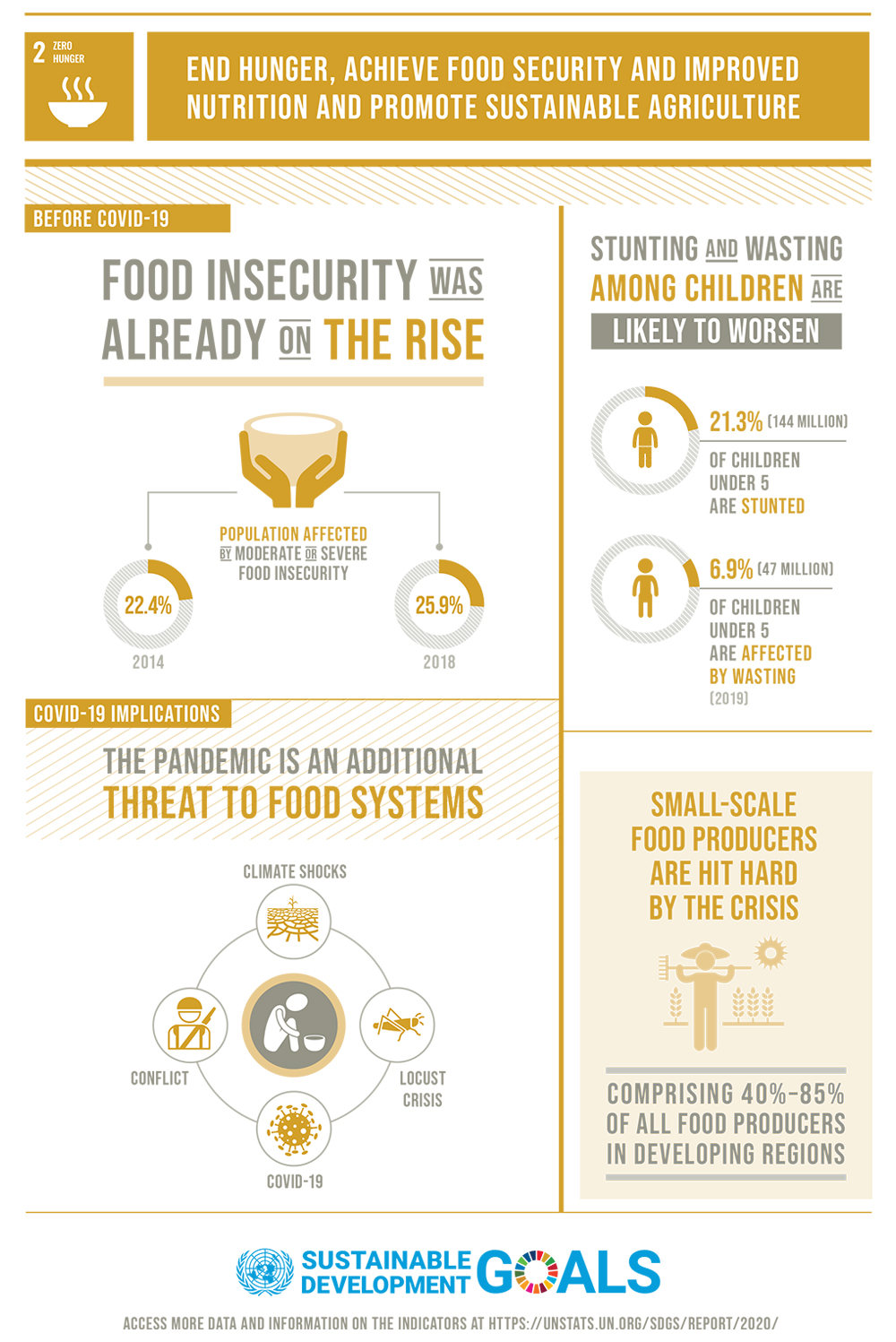Why ending hunger is important to us
To ensure every individual has an opportunity to exercise their basic human right to food. Starvation and malnutrition go against the principles of sustainable development which aim to ensure peace and prosperity. Unavailability of food leads to starvation, one of the most severe humanitarian crises and a leading cause of death in underdeveloped countries. If not the worst case, food shortage also contributes to malnutrition for underdeveloped and underprivileged communities.
Malnutrition leads to lower life expectancy, higher mortality, declining population, depleting human resources etc. These ill consequences further emphasize the importance of health and nutrition. As per Sustainable Development Goals Report-2020, despite initially observing a decline over the decades, the number of people suffering from hunger had once again begun to rise in 2015; Asia and African continents being one of the most affected by starvation and undernourishment.
There is also a noticeable difference between the proportion of the population who are undernourished and overweight. As per a report published by Food and Agriculture Organization of the United States) (FAO), in 2019, 690 million people were estimated to be undernourished with 144 million children having stunted in their growth. The study additionally states that the food security crisis also arises from the disparity between availability of food in specific regions and the major wasting of food in other regions.
This necessitates sustainable agriculture and responsible consumption. Sustainable and resilient forms of agriculture are also necessary to assist drought ridden lands as well as underproductive and unused fertile lands.

Understanding the root cause of hunger
Inavailability to food security stems from unstable social and economic institutions. The UNDP has identified this instability and unavailability to be prevalent in war torn nations, economically deprived areas, conflict ridden areas etc. Inflation, climatic conditions and natural disasters also play a prominent role in disrupting food security and distribution. Communities belonging to rural areas or poverty ridden areas are primary victims of food scarcity.
Wasting/malnourished children with stunted growth is a symbol of the jeopardised future. Undernourishment is especially dangerous for pregnant women, wherein the food scarcity and lack of nutrition leads to anaemia.
According to a Covid-19 analysis by the World Food Programme, the pandemic has halted movement of goods and means of production. This further endangers the already declining food security. Small scale producers are affected deeply by the pandemic and the areas which these small food producers are accessible to starve in return. It has affected the food production and distribution systems, further aggravating the issue of food scarcity.
The pandemic has also decreased the purchasing power due to rising inequality and increased expenditure for health. With both availability and affordability at a low, vulnerable groups face the worst of the hunger crisis in the pandemic.
Undernourishment is a rising concern especially amongst children in the face of a virus that challenges immunity and health, with a threat of quicker contagiousness given the vulnerability of the poor. Therefore, not only is the pandemic an economic crisis, but also a human development crisis.
Changemakers fighting hunger
There are different stakeholders such as individuals, institutions and organizations which are currently engaged in activities that aim to bring a positive change. Various global organizations, philanthropists and young leaders are involved in initiatives that directly or indirectly address the issue of global hunger crisis. Non profit organizations based regionally, such as Feeding America in the US and Don’t waste food in India, work locally to tackle the imminent threat of food shortage in immediate areas. There are more globally focused organizations such as Action Against Hunger and The Hunger project which decentralize into grassroots areas of action by promoting advocacy and innovative women-centric strategies.
Young generation is also actively engaged in fighting hunger, for instance; Chander Payne who was the cornerstone of Urban Beet, an initiative to teach sustainable farming techniques in urban spaces; and Kiran Sridhar who designed a platform named Waste No food to collect surplus food waste generated in restaurants, cafeterias etc and distribute the same in an efficient manner to those in need.
What you can do as a transformer
For food security and nutritious food, investment must be made in food production and distribution. This must be promoted along with sustainable agriculture practices as well as sustainable consumption. Accessibility has to be improved through social benefits and inclusivity.
What you as a transformer for the society can do, is use social advocacy, philanthropy and entrepreneurial/business ideas in an innovative manner to provide a progressive direction for reaching the goal. Instances of which are as follows:
Social Advocacy-
- Advocacy for agro-ecological farming
- Youth inclusive interventions for promoting modern technologies for progressive agriculture
- Participation in the process of land policy making
Social Philanthropy-
- Bankability of youth driven enterprises
- Financial empowerment and literacy
- Skill building through farmer field trips/schools, learning agri-food systems etc.
Business (models/tech/companies)-
- Modern agricultural practice and technological advancements in farming techniques
- Efficient and ecological irrigation
- Agripreneurship
References
Husain. A, Sandström. S, Greb. F & Pallanch. C (2020, April) COVID-19: Potential impact on the world’s poorest people. World Food Porgramme. Retrieved from https://docs.wfp.org/api/documents/WFP-0000114205/download/?_ga=2.241337546.952775517.1586900153-341597442.1584735263
World Health Organization. (2020). The state of food security and nutrition in the world 2020: transforming food systems for affordable healthy diets (Vol. 2020). Food & Agriculture Org.
https://www.undp.org/sustainable-development-goals#zero-hunger
Sustainability Program Manager
